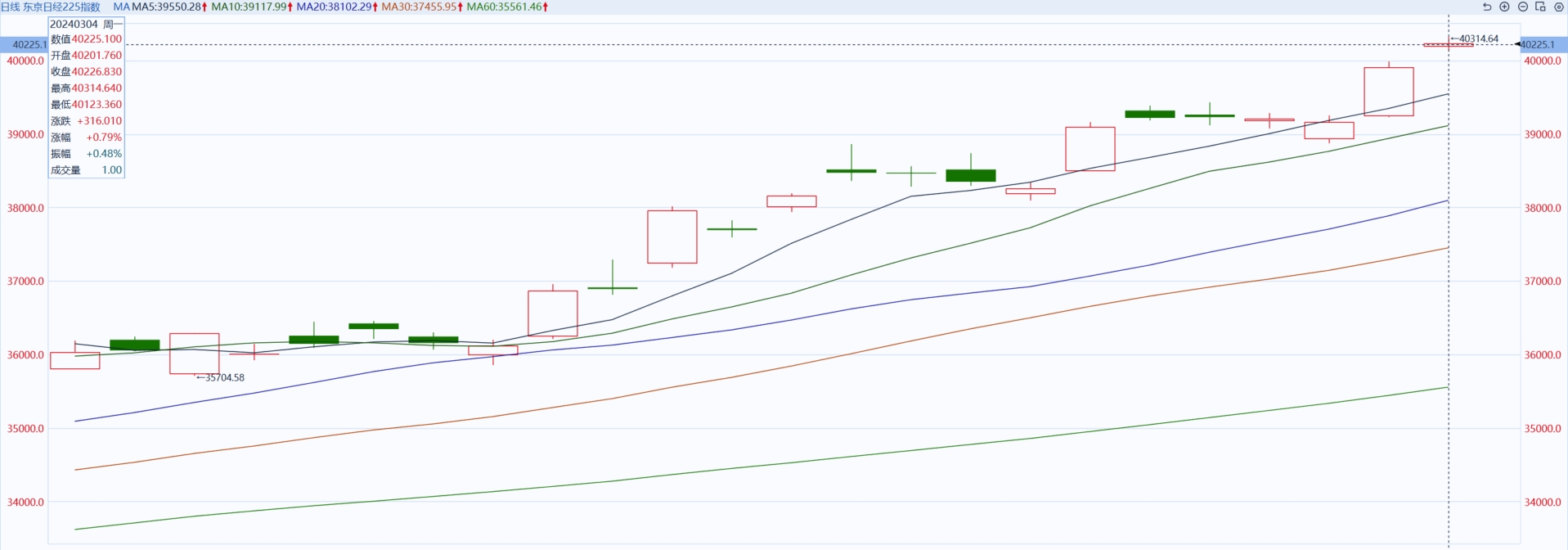The Japanese government is considering announcing that it will overcome deflation and the Nikkei 225 index will break through the 40,000 integer mark.
The Japanese government will carefully study the outcome of this spring's labor negotiations (also known as "spring bucket") and the inflation outlook to determine whether Japan has the conditions to declare a complete break from deflation, according to people familiar with the matter.。
On March 2 (last Saturday), according to sources familiar with the situation, Japan's central government is considering announcing that the economy has overcome deflation。The Japanese economy has been fighting deflation for more than 20 years, and once Japan announces that it is overcoming deflation, the market expects interest rate hikes to be on the agenda again.。
The conditions for abandoning negative interest rates are gradually being met.
For years, the Japanese economy has been caught in a vicious cycle of falling prices, which has hurt corporate profits and hampered employee wage growth.。To this end, the Japanese government began a huge economic stimulus package a decade ago, including negative interest rates and quantitative easing.。Japan's inflation data has picked up thanks to the Japanese government's efforts, coupled with the recent rise in import costs and the growth in the outlook for sustainable wages.。
According to the Japanese government's 2024 annual economic outlook report released at the end of last year, Japan's consumer price index (CPI) rose 3% year-on-year in 2022, starting with global inflation..2%。Japanese CPI to rise 3 in 2023, Japanese government forecasts.0%, 2024 will rise 2.5%。If the forecast is true, it will be the first time since 1989-1991 that Japanese inflation data has risen more than 2 percent for three consecutive years.。
Moving into 2024, Japan's inflation data continues to beat expectations。Japan's consumer price index, which excludes fresh food, rose 2 percent in January from a year earlier, data showed, marking the 22nd consecutive month that inflation has reached or exceeded the Bank of Japan's target.。According to a recent foreign media survey of economists, core consumer inflation in the Japanese capital is likely to accelerate again in February, exceeding the central bank's 2% target, suggesting that conditions are gradually in place to abandon negative interest rates.。
The Japanese government will carefully study the outcome of this spring's labor negotiations (also known as "spring bucket") and the inflation outlook to determine whether Japan has the conditions to declare a complete break from deflation, according to people familiar with the matter.。If they can, Japanese Prime Minister Fumio Kishida and cabinet members may publicly announce the change in the government's monthly economic report.。For now, administration officials say any policy decisions will depend on how the economy performs.。
Japanese stocks rose above the 40,000 integer mark without fear of raising interest rates.
However, according to sources, within the Japanese government, there are still some officials who are cautious about ending the rate hike, as there is still a lot of uncertainty about the price outlook and Japan's macroeconomy, with the Japanese economy briefly and unexpectedly falling into a technical recession at the end of 2023.。Some officials also believe that declaring an end to deflation is only a formality and is not a priority.。Because even now, Japan's official position is that Japan is not in a state of deflation。
The Bank of Japan also said it expects Japan's core consumer price growth to gradually slow in the coming months。
The market is concerned that once Japan announces that it has overcome deflation, a 17-year suspension of interest rate hikes is likely to be put back on the agenda.。Once a rate hike occurs, the possibility of a sudden misfire in the soaring Japanese stocks cannot be ruled out。
In response, Bank of Japan Governor Kazuo Ueda said on February 29 that it has not yet reached the situation where it is expected to achieve its inflation target on a sustained and stable basis.。
As a practical central bank governor, Ueda has repeatedly fallen to the dovish side in the monetary policy shift.。In the 1990s, in order to address persistent deflation and the deteriorating economic situation, the Bank of Japan decided to introduce a zero interest rate policy。Behind this, there is the shadow of Ueda and the man。In addition, when then-central bank governor Kushiro decided to tighten monetary policy in 2000, Ueda and Nan also voted against it.。
However, there are also market participants to interpret: in the current inflationary environment, Ueda and the man's statement, not to dispel the market's idea of raising interest rates, but to postpone the possible point of interest rate hike from March to April。
Japanese stocks continue to soar since early 2023。On February 22, the Nikkei 225 index closed at 39098..68 points, a new all-time high, surpassing the all-time high set in December 1989 (38957.44 points)。Then, after a few days of consolidation at the highs, on March 1, the Nikkei 225 index rose another 1.9%, closed at 39,910.82 points, another record closing high。
On March 4, Japanese stocks continued to soar。The Nikkei 225 opened above the 40,000-point mark for the first time in history, rising 0 percent in the day..92%。Nikkei 225 up 0 as of press time.79%, provisional 40226.83 points。

·Original
Disclaimer: The views in this article are from the original Creator and do not represent the views or position of Hawk Insight. The content of the article is for reference, communication and learning only, and does not constitute investment advice. If it involves copyright issues, please contact us for deletion.